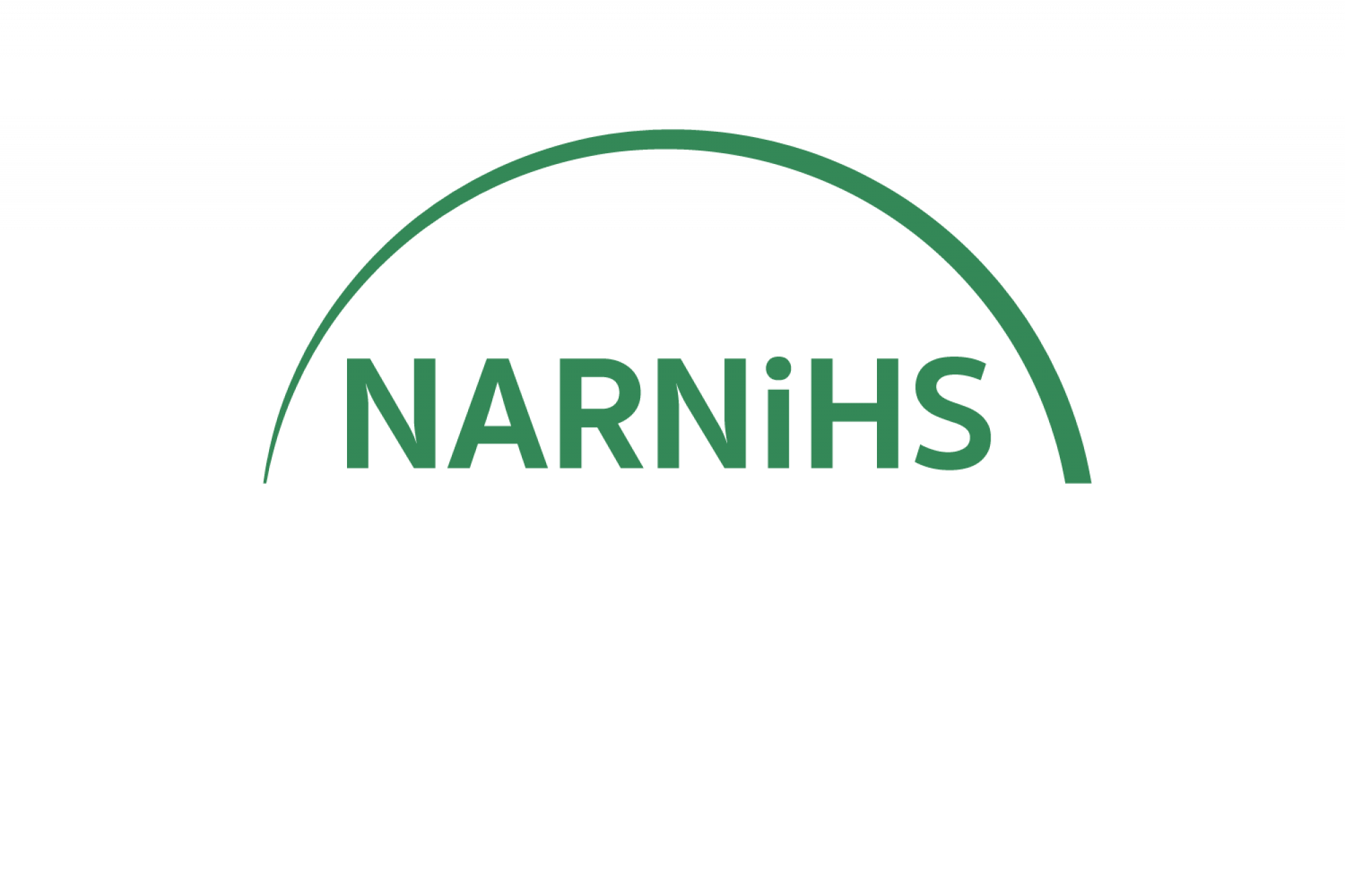The Founding
13 June 2014.
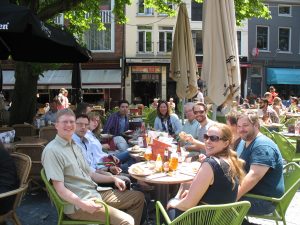
The initial plans for the North American Research Network in Historical Sociolinguistics (NARNiHS) were hatched by Mark Richard Lauersdorf, Fernando Tejedo-Herrero, and Rob Howell over beverages at a café in Utrecht in the Netherlands in the afterglow of the conference Mobility, variability and changing literacies in Modern Times (organized by Anita Auer and Mikko Laitinen). In the following months, Lauersdorf and Tejedo-Herrero were joined by Joe Salmons and Don Tuten to move the project forward to its first, organizational meetings and its official NARNiHS name (courtesy of Joe Salmons).
———————————————————————————————————
Initial Organizational Meeting, University of Wisconsin – Madison
30 September – 2 October 2016.
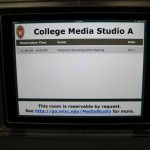
Twelve invited scholars along with students and faculty from UW-Madison participated in discussions of the need for a North American research network in historical sociolingustics (the “NARNiHS manifesto”) and the current state of the field. Ten-minute “lightning talks” by the invitees (Laurel Brinton, Josh Brown, Peter Grund, Rob Howell, Mark Lauersdorf, John Lipski, Felecia Lucht, Tom Purnell, Joe Salmons, Israel Sanz-Sánchez, Fernando Tejedo-Herrero, and Don Tuten) provided a snapshot of current work by North American scholars working in a range of areas in historical sociolinguistics. Additional time was devoted to planning and strategizing for the development of NARNiHS as an organization. See the Madison booklet.
———————————————————————————————————
Second Planning Meeting, Emory University (Atlanta)
10-11 May 2017.
Nine invited scholars continued discussion of the development of NARNiHS, focusing specifically on the first public activities sponsored by the organization and scheduled to occur at the LSA 2017 Linguistic Institute. In addition, the participants (Joshua Bousquette, Al Byrnes, Ben Frey, Rob Howell, Robert Klosinski, Mark Lauersdorf, Paul Roberge, Joe Salmons, and Don Tuten) again shared snapshots of their research in historical sociolinguistics in a round of “lightning talks”. See the Emory booklet.
———————————————————————————————————
NARNiHS at the LSA 2017 Linguistic Institute (University of Kentucky)
5 July – 1 August 2017.
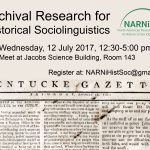
During the month-long Summer Institute of the Linguistic Society of America, NARNiHS sponsored a range of professional activities under the title “Historical Sociolinguistics Toolkit”, including a designated “course cluster” of Institute courses, a hands-on archival workshop, informal networking opportunities (details of the “Toolkit”), and the organization’s first formal professional conference (see next entry).
———————————————————————————————————
Inaugural Conference of the North American Research Network in Historical Sociolinguistics (NARNiHS)
21-22-23 July 2017.
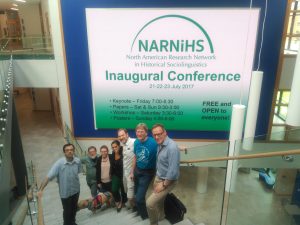
Co-located with the LSA 2017 Linguistic Institute, the inaugural NARNiHS conference (organized by Lauersdorf, Salmons, Tejedo-Herrero, and Tuten along with Abbey Thomas and Kelly Wright) brought together an audience of 75-80 for the keynote presentation by Stephan Elspaß, and 30-35 participants for the full day of professional presentations the following day. The conference ended with an action-packed digital tools and methods workshop (led by Kelly Wright) and a successful poster session. Conference website.
———————————————————————————————————
NARNiHS workshop at NWAV 46 (University of Wisconsin – Madison)
2-5 November 2017.
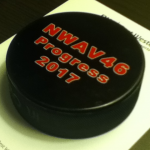 To promote NARNiHS across the professional sub-disciplines that historical sociolinguistics entails, a group of NARNiHS core members (Joshua Bousquette, Rob Howell, Mark Richard Lauersdorf) applied and were selected to present the workshop “Texts as data sources for historical sociolinguistics” at the 46th New Ways of Analyzing Variation conference. See the full NWAV 46 program, or here: NWAV 46 Booklet (Nov 3) . This was the initial step toward the ultimate decision to submit workshop and special session proposals annually to establish a regular NARNiHS presence at NWAV.
To promote NARNiHS across the professional sub-disciplines that historical sociolinguistics entails, a group of NARNiHS core members (Joshua Bousquette, Rob Howell, Mark Richard Lauersdorf) applied and were selected to present the workshop “Texts as data sources for historical sociolinguistics” at the 46th New Ways of Analyzing Variation conference. See the full NWAV 46 program, or here: NWAV 46 Booklet (Nov 3) . This was the initial step toward the ultimate decision to submit workshop and special session proposals annually to establish a regular NARNiHS presence at NWAV.
———————————————————————————————————
NARNiHS Steering Group instantiated
October-November 2017.
To provide a portion of “infrastructure” to ensure forward continuity of NARNiHS, the four organizing members (Lauersdorf, Salmons, Tejedo-Herrero, Tuten) formed the first NARNiHS Steering Group (SG) in late October – early November 2017, being joined on this initial Steering Group by Josh Brown, Alex D’Arcy, Israel Sanz-Sánchez, and Kelly Wright. The initial Steering Group reached its full capacity of 9 members with the addition of Nandi Sims in February 2019.
———————————————————————————————————
Sister Society of the Linguistics Society of America
January 2018.
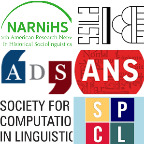
The first official item of business attended to by the NARNiHS Steering Group was the establishment of Sister Society status with the Linguistic Society of America (LSA), officially finalized in January 2018. Sister Society affiliation with the LSA means, among other things, that NARNiHS will hold an “annual meeting” co-located with the LSA annual meeting every year in January – the 1st Annual Meeting of NARNiHS being held on 05 January 2019 in New York City.
———————————————————————————————————
NARNiHS goes online!
Summer 2018.
To increase its public profile, NARNiHS went live with its official website (a WordPress installation) at narnihs.org (the address you are currently visiting) on 01 June 2018. A Twitter presence, @NARNiHS, was added to the line-up of digital communication tools on 14 September 2018, with the first official NARNiHS tweet (no, not “Hello world!”) sent on 18 September 2018. These tools joined the NARNiHS listserv (NARNIHS@lsv.uky.edu) which, as the first communication channel connecting NARNiHS members, had been launched on 11 August 2017, shortly after the inaugural NARNiHS conference in July 2017 (see above).
———————————————————————————————————
NARNiHS expands its “brand”
September-October 2018.
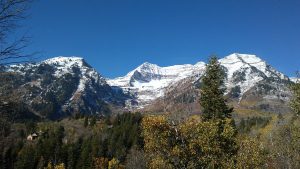
In an effort to build out the research network and increase the direct participation of members in NARNiHS-related activities, the NARNiHS Steering Group put in place guidelines for members to propose “NARNiHS-branded” talks, workshops, panels, etc. at professional venues beyond the NARNiHS Annual Meeting (LSA Sister Society) and NARNiHS @ the KFLC (see below). As an initial test of the possibilities of such “NARNiHS-branded” activities, several members coordinated NARNiHS participation in the annual conference of the Linguistics Association of the Southwest (LASSO), organized by Brigham Young University in Aspen Grove (Utah), 11-13 October 2018. High in the Wasatch Mountains, two NARNiHS-sponsored panels featured six presenters that discussed a variety of topics on language variation and change in the history of Spanish: Tania Avilés, Sonia Kania, Jeremy King, Covadonga Lamar, Israel Sanz, and Donald Tuten. This successful initiative provided a model for future NARNiHS-sponsored panels at other linguistics conferences. See the full LASSO program.
———————————————————————————————————
First general members meeting
04 January 2019.
In connection with the First Annual Meeting of the North American Research Network in Historical Sociolinguistics (see next entry below), the NARNiHS Steering Group sponsored the first open meeting for NARNiHS members and interested parties. After an introductory discussion of the origin and goals of NARNiHS, participants shared their research interests in historical sociolinguistics and engaged in general discussion about ways for members to become directly involved in the work of NARNiS to promote historical sociolinguistics in North America. The “NARNiHS General Meeting” has become a standard component of every NARNiHS Annual Meeting since this first one in 2019 and serves as a opportunity to inform participants about the state of NARNiHS and its activities and events, and about the state of the field of historical sociolinguistics in general.
———————————————————————————————————
First(!) Annual Meeting of the North American Research Network in Historical Sociolinguistics (NARNiHS)
05 January 2019.
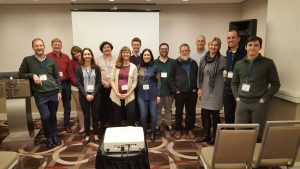
In its capacity as a Sister Society of the Linguistics Society of America (LSA) (see above), NARNiHS held its first annual meeting, co-located with the LSA Annual Meeting, at the Sheraton New York Times Square Hotel in New York City. Nine 20-minute papers and seven posters, by participants from five countries, presented cutting edge work in historical sociolinguistics, investigating multiple languages in their socio-historical contexts from medieval to near-present-day. See the NARNiHS 2019 program and NARNiHS in the complete LSA 2019 program.
———————————————————————————————————
NARNiHS Research Incubator (at the KFLC)
12-13 April 2019.
As an initial test of the possibilities for establishing a recurring NARNiHS presence at the long-standing international conference KFLC: The Languages, Literatures, and Cultures Conference (held annually at the University of Kentucky since 1948), Don Tuten (along with Joel Rini) organized a special NARNiHS-sponsored Historical Sociolinguistics panel in the venerable Hispanic Linguistics Division of the conference in April 2018.
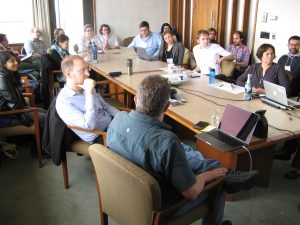
In April 2019 the NARNiHS Research Incubator debuted at the KFLC as a collaborative conference environment, a “research incubator”, where presenters bring work that is in-progress, exploratory, proof-of-concept, prototyping; and the audience participates in the brainstorming and workshopping of those new ideas. We see the NARNiHS Research Incubator as a place for testing/pushing boundaries; developing new theories, methods, models, tools; seeking feedback from peers willing to engage in productive assessment of fledgling ideas and nascent projects. See the 2019 NARNiHS Research Incubator program and NARNiHS in the complete KFLC 2019 program.
———————————————————————————————————
NARNiHS goes virtual!
17-18 April 2020.
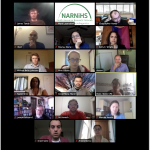
Due to the public health crisis around the COVID-19 virus (which caused the cancellation of the KFLC host venue), NARNiHS decided to undertake a bold experiment and move its 2020 Research Incubator into a fully online environment. Within a mere 5 weeks, the organizing committee (Israel Sanz, Nandi Sims, Don Tuten, Kelly Wright) went from 0 to 100 and brought everything together. The experiment was a success, as nine presenters and 15 other NARNiHS members gathered via web-based video-conference over two days to deliver eight presentations and engage in the collaborative brainstorming, collective discussion, and incubation of ideas that is the hallmark of the NARNiHS Research Incubator! See the 2020 NARNiHS Research Incubator program.
As the COVID-19 crisis continued into 2021, the experience gained in moving the Research Incubator online in 2020 served subsequent organizing committees well as the 2021 versions of both the Annual Meeting and the Research Incubator, and the 2022 Annual Meeting, were also moved online.
———————————————————————————————————
NARNiHS gets out the vote
December 2020.
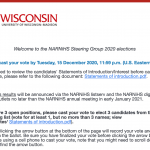
As the NARNiHS Steering Group (SG) approached the end of its third full year of existence, the first-ever NARNiHS election cycle was put into place to elect three new SG members and thus begin the rotation of Steering Group membership (see Historical SG rosters). November nominations from the NARNiHS membership produced a slate of 6 candidates for the December elections period, resulting in three new Steering Group members beginning their 3-year terms at the January 2021 SG meeting held in connection with the NARNiHS 2021 Annual Meeting.
———————————————————————————————————
NARNiHS Convening Group instantiated
January and April 2021.
Acting on a Steering Group (SG) decision from the 2nd-quarter SG meeting in April of 2020, the NARNiHS SG put into place, at the start of the new year 2021, a type of “executive committee” of the SG in the form of a Convening Group (CG), consisting of an incoming convenor, convenor, and outgoing convenor, in order to enhance stability in the organizational continuity of NARNiHS. At the SG’s request Mark Lauersdorf agreed to stay on as convenor for 2021, joined by Israel Sanz-Sánchez as incoming convenor (elected into that position by the SG at the April 2020 meeting), with Sandrine Talleur elected in April 2021 to start as incoming convenor in 2022 – at which time Sanz-Sánchez becomes convenor and Lauersdorf becomes outgoing convenor for a full CG team in 2022.
———————————————————————————————————
NARNiHS partners with SHEL (Studies in the History of the English Language)
(June 2019 –) May 2022.

At the invitation of Colette Moore, organizer of SHEL-12 at the University of Washington, NARNiHS joined the biennial SHEL meeting with a thread on the Historical Sociolinguistics of English. Originally slated for May 2021, the COVID-delayed conference took place in Seattle in May 2022 with two NARNiHS-sponsored panels and a discussion of “Historical sociolinguistics as a field and the North American Research Network in Historical Sociolinguistics (NARNiHS) as a professional support initiative”.
This presence at SHEL-12 marked the beginning of what is hoped to be a long-term, fruitful relationship between NARNiHS and SHEL, and represents the start of new initiative to maximize collaboration with other organizations as another means toward furthering the NARNiHS mission to strengthen and promote the study of historical sociolinguistics in North America.
———————————————————————————————————
Reading with NARNiHS – reading group debuts!
February 2026.
Getting its initial impetus from Don Tuten, and led to implementation by Anna Havinga, the reading group, Reading with NARNiHS, took shape in 2025. Designed as a venue for engagement with cutting-edge work in historical sociolinguistics accessible to researchers at all levels, Reading with NARNiHS combines aspects of “meet the author” + “author interview” + “authors read their works” + “classic reading group discussion”, allowing for maximum interaction with brand new scholarship and its authors.
The inaugural session of Reading with NARNiHS was held on 19 February 2026 with Don Tuten invited as the first guest author. The session was a rousing success – from the 95(!) total registrants, more than 35 scholars were able to join us to meet Don Tuten, hear him present his work, and join him in robust discussion of theory, method, and data in historical sociolinguistics.
